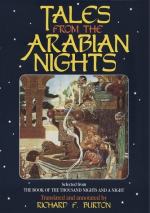[FN#207] Evidently referring to the runaway Abu al-Hasan, not to the she-Mercury.
[FN#208] An unmarried man is not allowed to live in a respectable quarter of a Moslem city unless he takes such precaution. Lane (Mod. Egypt. passim) has much to say on this point; and my excellent friend the late Professor Spitta at Cairo found the native prejudice very troublesome.
[FN#209] Arab. “Ya fulan"=O certain person (fulano in Span. and Port.) a somewhat contemptuous address.
[FN#210] Mr. Payne remarks, “These verses apparently relate to Aboulhusn, but it is possible that they may be meant to refer to Shemsennehar.” (iii. 80.)
[FN#211] Arab. and Pers “Bulur” (vulg. billaur) retaining the venerable tradition of the Belus- river. In Al-Hariri (Ass. of Halwan) it means crystal and there is no need of proposing to translate it by onyx or to identify it with the Greek , the beryl.
[FN#212] The door is usually shut with a wooden bolt.
[FN#213] Arab. “Ritanah,” from “Ratan,” speaking any tongue not Arabic, the allusion being to foreign mercenaries, probably Turks. In later days Turkish was called Muwalla’, a pied horse, from its mixture of languages.
[FN#214] This is the rule; to guard against the guet-apens.
[FN#215] Arab. “Walidati,” used when speaking to one not of the family in lieu of the familiar “Ummi"=my mother. So the father is Walid=the begetter.
[FN#216] This is one of the many euphemistic formulae for such occasions: they usually begin “May thy head live.” etc.
[FN#217] Arab. “Kanun,” an instrument not unlike the Austrian zither; it is illustrated in Lane (ii. 77).
[FN#218] This is often done, the merit of the act being transferred to the soul of the deceased.
[FN#219] The two amourists were martyrs; and their amours, which appear exaggerated to the Western mind, have many parallels in the East. The story is a hopeless affair of love; with only one moral (if any be wanted) viz., there may be too much of a good thing. It is given very concisely in the Bul. Edit. vol. i.; and more fully in the Mac. Edit. aided in places by the Bresl. (ii. 320) and the Calc. (ii. 230). ## [FN#220] Lane is in error (vol. ii. 78) when he corrects this to “Shah Zeman”; the name is fanciful and intended to be old Persian, on the “weight” of Kahraman. The Bul. Edit. has by misprint “Shahraman.”
[FN#221] The “topothesia” is worthy of Shakespeare’s day. “Khalidan” is evidently a corruption of “Khalidatani” (for Khalidat), the Eternal, as Ibn Wardi calls the Fortunate Islands, or Canaries, which owe both their modern names to the classics of Europe. Their present history dates from A.D. 1385, unless we accept the Dieppe-Rouen legend of Labat which would place the discovery in A.D. 1326. I for one thoroughly believe in the priority on the West African Coast, of the gallant descendants of the Northmen.




